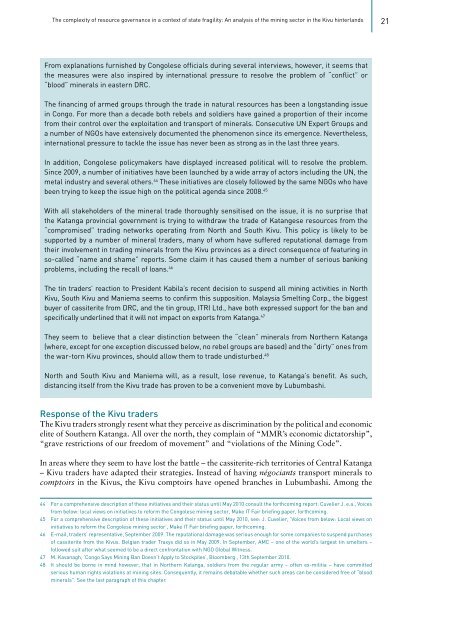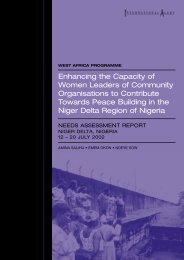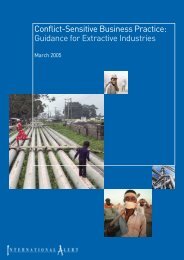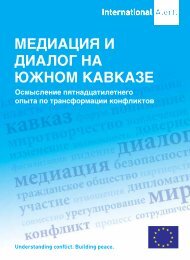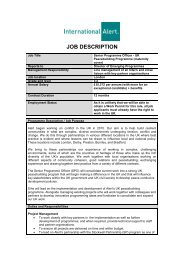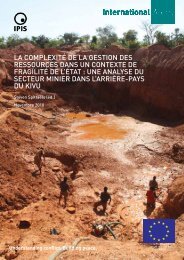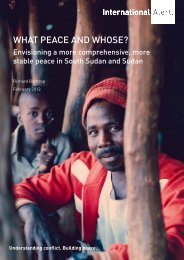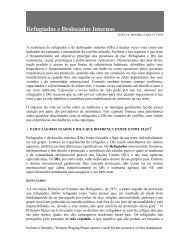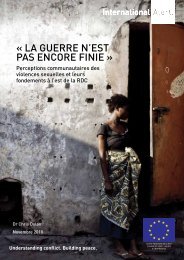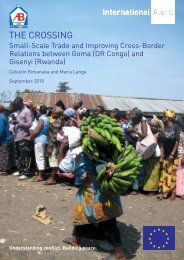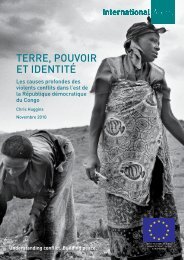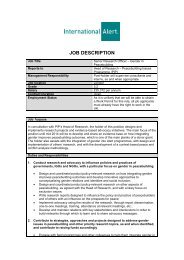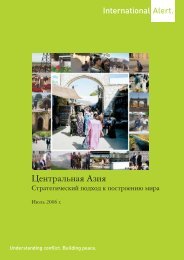The complexiTy of resource governance in a conTexT of sTaTe ... - Ipis
The complexiTy of resource governance in a conTexT of sTaTe ... - Ipis
The complexiTy of resource governance in a conTexT of sTaTe ... - Ipis
You also want an ePaper? Increase the reach of your titles
YUMPU automatically turns print PDFs into web optimized ePapers that Google loves.
<strong>The</strong> complexity <strong>of</strong> <strong>resource</strong> <strong>governance</strong> <strong>in</strong> a context <strong>of</strong> state fragility: An analysis <strong>of</strong> the m<strong>in</strong><strong>in</strong>g sector <strong>in</strong> the Kivu h<strong>in</strong>terlands<br />
21<br />
From explanations furnished by Congolese <strong>of</strong>ficials dur<strong>in</strong>g several <strong>in</strong>terviews, however, it seems that<br />
the measures were also <strong>in</strong>spired by <strong>in</strong>ternational pressure to resolve the problem <strong>of</strong> “conflict” or<br />
“blood” m<strong>in</strong>erals <strong>in</strong> eastern DRC.<br />
<strong>The</strong> f<strong>in</strong>anc<strong>in</strong>g <strong>of</strong> armed groups through the trade <strong>in</strong> natural <strong>resource</strong>s has been a longstand<strong>in</strong>g issue<br />
<strong>in</strong> Congo. For more than a decade both rebels and soldiers have ga<strong>in</strong>ed a proportion <strong>of</strong> their <strong>in</strong>come<br />
from their control over the exploitation and transport <strong>of</strong> m<strong>in</strong>erals. Consecutive UN Expert Groups and<br />
a number <strong>of</strong> NGOs have extensively documented the phenomenon s<strong>in</strong>ce its emergence. Nevertheless,<br />
<strong>in</strong>ternational pressure to tackle the issue has never been as strong as <strong>in</strong> the last three years.<br />
In addition, Congolese policymakers have displayed <strong>in</strong>creased political will to resolve the problem.<br />
S<strong>in</strong>ce 2009, a number <strong>of</strong> <strong>in</strong>itiatives have been launched by a wide array <strong>of</strong> actors <strong>in</strong>clud<strong>in</strong>g the UN, the<br />
metal <strong>in</strong>dustry and several others. 44 <strong>The</strong>se <strong>in</strong>itiatives are closely followed by the same NGOs who have<br />
been try<strong>in</strong>g to keep the issue high on the political agenda s<strong>in</strong>ce 2008. 45<br />
With all stakeholders <strong>of</strong> the m<strong>in</strong>eral trade thoroughly sensitised on the issue, it is no surprise that<br />
the Katanga prov<strong>in</strong>cial government is try<strong>in</strong>g to withdraw the trade <strong>of</strong> Katangese <strong>resource</strong>s from the<br />
“compromised” trad<strong>in</strong>g networks operat<strong>in</strong>g from North and South Kivu. This policy is likely to be<br />
supported by a number <strong>of</strong> m<strong>in</strong>eral traders, many <strong>of</strong> whom have suffered reputational damage from<br />
their <strong>in</strong>volvement <strong>in</strong> trad<strong>in</strong>g m<strong>in</strong>erals from the Kivu prov<strong>in</strong>ces as a direct consequence <strong>of</strong> featur<strong>in</strong>g <strong>in</strong><br />
so-called “name and shame” reports. Some claim it has caused them a number <strong>of</strong> serious bank<strong>in</strong>g<br />
problems, <strong>in</strong>clud<strong>in</strong>g the recall <strong>of</strong> loans. 46<br />
<strong>The</strong> t<strong>in</strong> traders’ reaction to President Kabila’s recent decision to suspend all m<strong>in</strong><strong>in</strong>g activities <strong>in</strong> North<br />
Kivu, South Kivu and Maniema seems to confirm this supposition. Malaysia Smelt<strong>in</strong>g Corp., the biggest<br />
buyer <strong>of</strong> cassiterite from DRC, and the t<strong>in</strong> group, ITRI Ltd., have both expressed support for the ban and<br />
specifically underl<strong>in</strong>ed that it will not impact on exports from Katanga. 47<br />
<strong>The</strong>y seem to believe that a clear dist<strong>in</strong>ction between the “clean” m<strong>in</strong>erals from Northern Katanga<br />
(where, except for one exception discussed below, no rebel groups are based) and the “dirty” ones from<br />
the war-torn Kivu prov<strong>in</strong>ces, should allow them to trade undisturbed. 48<br />
North and South Kivu and Maniema will, as a result, lose revenue, to Katanga’s benefit. As such,<br />
distanc<strong>in</strong>g itself from the Kivu trade has proven to be a convenient move by Lubumbashi.<br />
Response <strong>of</strong> the Kivu traders<br />
<strong>The</strong> Kivu traders strongly resent what they perceive as discrim<strong>in</strong>ation by the political and economic<br />
elite <strong>of</strong> Southern Katanga. All over the north, they compla<strong>in</strong> <strong>of</strong> “MMR’s economic dictatorship”,<br />
“grave restrictions <strong>of</strong> our freedom <strong>of</strong> movement” and “violations <strong>of</strong> the M<strong>in</strong><strong>in</strong>g Code”.<br />
In areas where they seem to have lost the battle – the cassiterite-rich territories <strong>of</strong> Central Katanga<br />
– Kivu traders have adapted their strategies. Instead <strong>of</strong> hav<strong>in</strong>g négociants transport m<strong>in</strong>erals to<br />
comptoirs <strong>in</strong> the Kivus, the Kivu comptoirs have opened branches <strong>in</strong> Lubumbashi. Among the<br />
44 For a comprehensive description <strong>of</strong> these <strong>in</strong>itiatives and their status until May 2010 consult the forthcom<strong>in</strong>g report: Cuvelier J. e.a., Voices<br />
from below: local views on <strong>in</strong>itiatives to reform the Congolese m<strong>in</strong><strong>in</strong>g sector, Make IT Fair brief<strong>in</strong>g paper, forthcom<strong>in</strong>g.<br />
45 For a comprehensive description <strong>of</strong> these <strong>in</strong>itiatives and their status until May 2010, see: J. Cuvelier, ‘Voices from below: Local views on<br />
<strong>in</strong>itiatives to reform the Congolese m<strong>in</strong><strong>in</strong>g sector’, Make IT Fair brief<strong>in</strong>g paper, forthcom<strong>in</strong>g.<br />
46 E-mail, traders’ representative, September 2009. <strong>The</strong> reputational damage was serious enough for some companies to suspend purchases<br />
<strong>of</strong> cassiterite from the Kivus. Belgian trader Traxys did so <strong>in</strong> May 2009. In September, AMC – one <strong>of</strong> the world’s largest t<strong>in</strong> smelters –<br />
followed suit after what seemed to be a direct confrontation with NGO Global Witness.<br />
47 M. Kavanagh, ‘Congo Says M<strong>in</strong><strong>in</strong>g Ban Doesn’t Apply to Stockpiles’, Bloomberg , 13th September 2010.<br />
48 It should be borne <strong>in</strong> m<strong>in</strong>d however, that <strong>in</strong> Northern Katanga, soldiers from the regular army – <strong>of</strong>ten ex-militia – have committed<br />
serious human rights violations at m<strong>in</strong><strong>in</strong>g sites. Consequently, it rema<strong>in</strong>s debatable whether such areas can be considered free <strong>of</strong> “blood<br />
m<strong>in</strong>erals”. See the last paragraph <strong>of</strong> this chapter.


